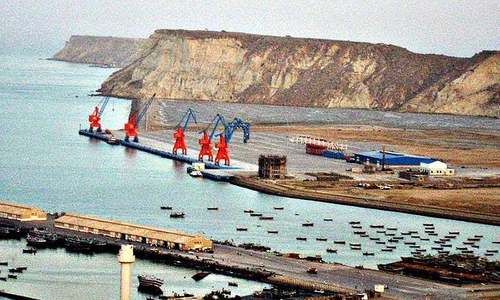GWADAR: Former chief minister of Balochistan Dr Abdul Malik Baloch believes that federal and provincial governments should prioritise the inclusion of Balochistan’s local communities in all projects being executed under the China-Pakistan Economic Corridor (CPEC).
“Their interests and identities need to be protected through legislation for economically sustainable and socially acceptable development,” he said, according to a press release.
Addressing a stakeholders’ roundtable at Gwadar, Dr Malik advocated a greater role of the locals in running organisations such as the Gwadar Port Authority and Gwadar Development Authority (GDA).
“How can you expect the local people not to be resentful if their share of jobs in provincial institutions such as GDA or the Gwadar Port Authority is minimal,” asked the former chief minister, adding that the share of jobs must be increased for locals in Gwadar, in particular, and Baloch people in general across the province.
Says locals should also be entrusted with running Gwadar Port, GDA
Political activists, provincial government officials, fishermen and business representatives participated in the round-table organised jointly by the Centre for Research and Security Studies (CRSS) and the Association for Integrated Development (AID).
They sounded frustrated with what they called the indifference of the federal and provincial governments to issues such as health, education and livelihoods of the fishermen. “Is it not ironical that we are surrounded by sea but we have hardly a pint of potable water,” asked a local trader dealing in fish.
Most of the delegates who deal in fisheries demanded subsidies or soft loans to further develop their business. “Almost 75 per cent of Gwadar’s population lives off the sea i.e. fishing but hardly has anybody access to subsidies or loans,” they said.
Almost all participants highlighted the dismal state of public health and educational institutions. Abul Hassan, a local political activist, asked if the CPEC agreements were about state-to-state loan and grants or they were about purely commercial projects. He bemoaned the fact that hardly any socio-economic impact study had ever been carried out before launching development projects in Gwadar.
People at large at the round table sounded wary of local politicians. “They [politicians] are ready to spend tens of millions on their election campaign but hardly seem to care for potable water that locals desperately need,” said a local fisherman at the stakeholders’ dialogue.
Residents of Gwadar at the dialogue also spoke about their discomfort with unusual strict security measures on roads connecting the port with the city. “These security measures would come across as less imposing if the personnel on checkpoints are sensitised on how to approach locals,” said Ashraf Hussein, a local politician.
They demanded immediate redressal of problems that local fishermen face because of the trawlers that intrude into Balochistan’s waters from Sindh.
Most of the participants also repeatedly underscored the need for urgently setting up technical education and training centres in Gwadar so that the city could produce skilled workers for the upcoming industrial zone.
Officials, speaking in their personal capacity, said that several demands by the local communities were being gradually addressed, albeit at a slow pace.
Published in Dawn, February 10th, 2020















































